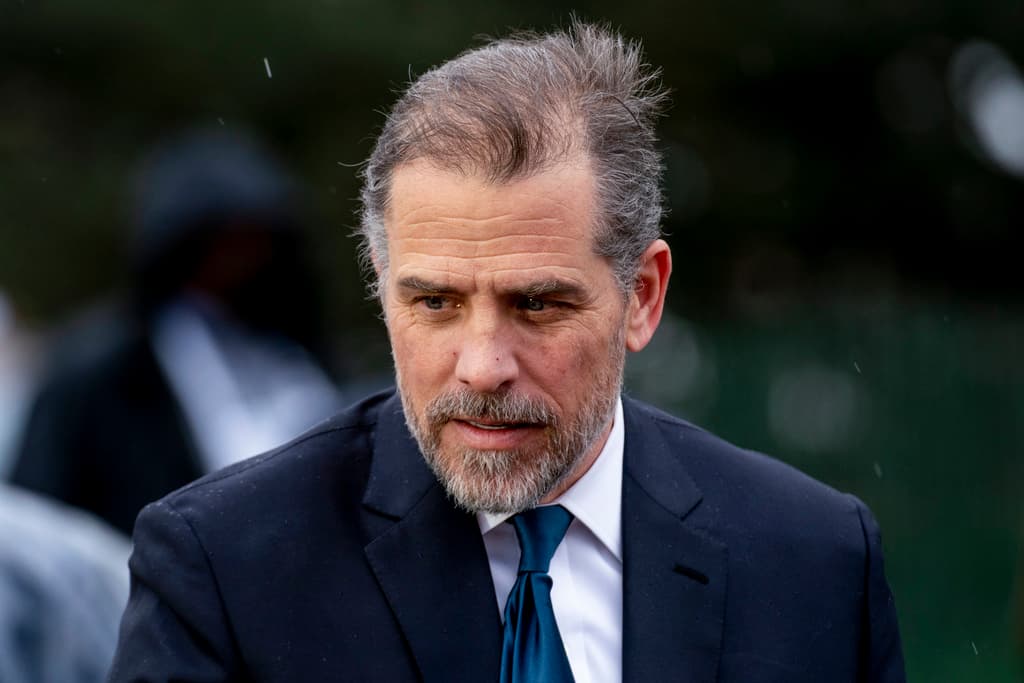Will Hunter Biden’s ‘Sweetheart’ Plea Deal Be Tossed in the Wake of Recent Disclosures?
A Delaware judge is supposed to approve the first son’s plea agreement at a July 26 hearing during which she has the discretion to throw the deal out or impose a stiffer than expected punishment.

Following fresh allegations from IRS whistleblowers and the release of a damaging FBI informant document painting the first son in an increasingly bad light, could Hunter Biden’s upcoming plea hearing end up not going as smoothly as he must hope?
In the past 36 hours, whistleblowers from the IRS spoke before Congress to decry the “preferential” treatment Mr. Biden allegedly received from prosecutors and testified that the first son had taken tax write-offs for drug-fueled vacations in France, consortium with prostitutes, and memberships to expensive sex clubs. Then, a scandalous informant document, known as an FD-1023, from the FBI detailed an alleged $10 million bribe paid to Mr. Biden and his father.
Mr. Biden previously agreed to plead guilty to two misdemeanor charges of “willful” tax evasion and to enter a “judicial diversion program” to address his illegal firearms purchase. He had lied about his drug use to purchase a gun. Mr. Biden’s plea agreement came after the United States attorney for Delaware, David Weiss, spent five years investigating him. This deal is unlikely to result in any prison time.
Mr. Biden’s attorneys have said publicly that they expect the deal to resolve all of their client’s outstanding legal issues. By contrast, Mr. Weiss has said the Hunter Biden affair remains an “ongoing investigation,” suggesting the first son could still be charged with other offenses.
Following the announcement of the plea agreement in June, many GOP elected officials, including Speaker McCarthy, called the “sweetheart deal” a miscarriage of justice, arguing that Mr. Biden would have been prosecuted years ago if not for his last name.
The presiding judge in this case, Maryellen Noreika, must approve or reject the plea deal during the hearing at Wilmington, Delaware, on July 26. She also has the option of delaying the certification of the agreement should she choose to review more information related to the so-called preferential treatment Mr. Biden received. Like Mr. Weiss, Judge Noreika was nominated to her position by President Trump, though at the time of her appointment in 2018 she also had the support of Delaware’s two Democratic senators, Chris Coons and Tom Carper, who recommended her for the position.
Jurists are given unilateral power in deciding whether to accept a defendant’s plea. Judge Noreika has a wide range of options at her disposal when presented with such arrangements by prosecutors, including accepting the deal, rejecting it outright and forcing a trial or a new agreement, or accepting the guilty plea while imposing different punishments than were prescribed by prosecutors.
Judge Noreika — who is not nearly as conservative in her rulings as some other Trump-appointed jurists — was confirmed to her seat in 2018 by a voice vote in the Senate, meaning no members of the upper chamber objected to her commission. For 25 years before her ascension to the federal bench, Judge Noreika worked in private practice on issues such as patent law, biochemicals, and pharmaceuticals.
Following the disclosure of the FD-1023 document that details the alleged $5 million bribe, conservatives are once again pointing out the “preferential treatment” Mr. Biden received due to his familial relations.
“Did you investigate these very credible accusations of bribery by Joe and Hunter Biden?” a Republican presidential candidate, Vivek Ramaswamy, asked on Twitter of DOJ officials. “Or did you ignore them altogether? If you replaced ‘Biden’ with ‘Trump’ in this same FD-1023, what would you have done?”
The plea deal is also threatened by a lawsuit from the conservative Heritage Foundation. The group’s Oversight Project has filed suit against the DOJ for allegedly failing to comply with a Freedom of Information Act request that would have allowed the public to review communications that mentioned the possibility of Mr. Weiss being appointed special counsel for the investigation into the first son.
A whistleblower from the Internal Revenue Service who aided Mr. Weiss’s investigation, Gary Shapley, has for weeks accused DOJ officials of hampering the Delaware prosecutor’s investigation, including denying him the status of special counsel. Mr. Shapley spoke about these allegations for multiple hours during a hearing before the House Oversight Committee on Wednesday.
Mr. Weiss denied ever requesting special counsel status in a carefully worded letter to Senator Graham.
“To clarify an apparent misperception and to avoid future confusion, I wish to make one point clear: in this case, I have not requested Special Counsel designation,” Mr. Weiss wrote on July 10. He also stated that he has “never been denied the authority to bring charges in any jurisdiction.” Previously he said his investigation was “geographically limited.”
Notably, Mr. Weiss only said in his letter that he did not formally request special counsel status. He did not address Mr. Shapley’s testimony that he said in a private meeting that justice department higher-ups were controlling his investigation and obstructing him from widening its scope.
The Heritage Foundation’s lawsuit seeking communications related to this issue aims to resolve the question of whether Mr. Weiss’s investigation was indeed hampered by Attorney General Garland’s inner circle before the plea deal is finalized.
“The records will lose utility if they are not produced in time for analysis and public dissemination prior to Hunter Biden’s July 26, 2023 plea hearing,” the Heritage Foundation lawsuit states, arguing that Congress, the federal court at Delaware, and the American people have the right to view these communications before a decision is made about Mr. Biden’s lenient plea arrangement.

